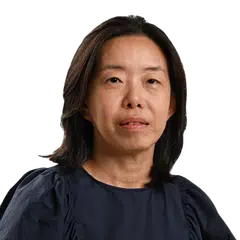News analysis
Ukraine war ceasefire: How will it impact the North Korea-Russia alliance?
Sign up now: Get insights on Asia's fast-moving developments

North Korean leader Kim Jong Un and Russian top security official Sergei Shoigu interact during Mr Shoigu's visit to North Korea, on March 22.
PHOTO: REUTERS
Follow topic:
SEOUL – As the Ukraine war ceasefire negotiations gain momentum under the mediation of the US, unease has set in over Pyongyang.
Pyongyang has been a crucial military partner to Moscow in the war, supplying much-needed artillery shells, missiles and troops in exchange for monetary compensation, food, fuel and advanced rocket technology.
But when the time comes for a truce, North Korea’s relationship with Russia will inevitably take a backseat, say analysts.
A March 28 intelligence update from the British Ministry of Defence estimated that North Korea has suffered more than 5,000 casualties in the war as at March. This would account for nearly half of the reported 11,000 troops it deployed to aid Russia in the battle against Ukraine since October 2024.
While North Korean leader Kim Jong Un was said to have dispatched an additional 3,000 soldiers in February
Ceasefire talks are still ongoing, but an agreement was reached on March 18 for both Ukraine and Russia to temporarily halt attacks on energy infrastructure facilities for 30 days.
Dr Cho Han-bum, senior research fellow at the think-tank Korea Institute for National Unification, told The Straits Times that it is natural for North Korea to feel uneasy about a ceasefire or possible ending of the war.
“From the perspective of North Korea, which has sent large-scale weapons support and troops, a ceasefire or end of the war would mean a decrease in its strategic value,” he said.
As Russia seeks to normalise relations with the US and Europe after the war, “its relationship with North Korea will become secondary”, said international relations professor Ramon Pacheco Pardo at King’s College London. He added that the “strong Russo-North Korean relationship will only continue as long as Moscow needs it”.
This is likely the reason for Mr Kim’s decision to “hold back” North Korea’s support recently by dispatching only a modest top-up of 3,000 troops, which is insufficient to replenish the North Korean battlefield losses, said Dr Doo Jin-ho, a principal research fellow at the Korea Institute for Defence Analyses. He described it as Mr Kim’s calculated leverage over Mr Putin.
“Mr Kim is closely monitoring Russia’s response, particularly whether it will be offering meaningful compensation for North Korea’s troop deployment and losses,” Dr Doo said at a briefing for foreign journalists in Seoul on April 8.
“Depending on Russia’s reaction, Mr Kim might scale up on his contributions or even pursue drastic measures such as downsizing or even withdrawing his troops.”
North Korea’s armed forces are among the five largest in the world, with nearly 1.3 million active personnel, and an additional 600,000 in reserve. The South Korean military estimates that the North’s elite forces number at least 40,000.
In times of uncertainty, it would make sense for Pyongyang to start taking steps to mend ties with its other ally, Beijing, said Prof Pacheco Pardo.
Their bilateral relations became tense in the past year
In a meeting with Mr Wang Yajun, China’s top envoy to North Korea, on Feb 18, the North’s Vice-Foreign Minister Pak Myong Ho expressed hopes for strong exchanges and cooperation with China.
On April 7, 14 Chinese staff arrived in Pyongyang to man a facility commemorating Chinese soldiers killed during the Korean War, marking the first such entry since the Chinese-North Korean border was sealed in early 2020.
Dr Cho said the move to thaw ties is likely precipitated by the developments in the Ukraine situation, and the result of “strategic judgments” by both North Korea and China to avoid further deterioration of relations.
On Moscow’s part, it is also doing its best to placate its security partner, sending its top security official Sergei Shoigu to Pyongyang for a one-day visit on March 21, with the carrot of an invitation for Mr Kim to visit Moscow later in 2025.
According to Russian media reports, Mr Shoigu reportedly assured Mr Kim of Russia’s commitment to the strategic partnership agreement and updated the leader about the US-Russia talks on the Ukraine situation.
Dr Doo believes that Mr Shoigu’s last-minute visit was aimed at “quelling North Korea’s growing discontent”, especially since North Korean troops provided the critical numbers needed for Russia’s successful recapture of the Kursk region from Ukrainian forces.
The Russian military said on April 8 that its forces had taken over the last foothold in the Kursk region that was invaded by Ukrainian troops in August 2024.
South Korean media have speculated that the invitation may be for Mr Kim to visit Moscow as early as May, to participate in Moscow’s Victory Day celebrations on May 9.
But Dr Doo thinks Mr Kim would want something more exclusive than that.
“Mr Kim is likely expecting a more differentiated and preferential treatment from Russia, rather than just appearing at the Victory Day parade along with other allies. This is because none of them sent their troops nor dispatched special operation forces to help Russia as North Korea did.”
While it remains to be seen if North Korea stands to reap the expected pound of flesh for its contributions to Russia, it has already gained tremendous strategic status in the process, said Dr Doo.
“If you look at how little North Korea actually has to offer, just troops and weapons, no advanced technology, no money, but yet it managed to score an alliance. That is a huge deal by itself,” he said.
“Ukraine doesn’t have an alliance like that.”
Wendy Teo is The Straits Times’ South Korea correspondent based in Seoul. She covers issues concerning the two Koreas.


